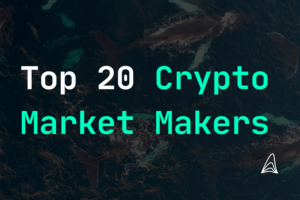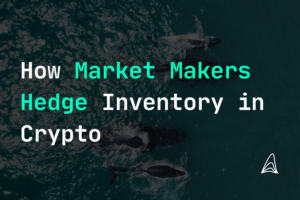
How Crypto Market Makers and Exchanges Collaborate
- Jakob Brezigar
- Last updated: 8.May 2024
- Reading time: 5 min
Ever played a video game where you’re trying to trade items with others but the server keeps lagging? Imagine that scenario in the crypto world. It would be quite the headache! Luckily, crypto market makers and cryptocurrency exchanges collaborate to ensure the cryptocurrency markets run smoother than a perfect online game lobby. This article goes into how market makers and exchanges collaborate and thus keep the crypto markets well-stocked with liquidity, while exchanges provide the virtual space and tools that help everyone play the game efficiently and effectively.

Table of Contents
What role do market makers play in financial markets?
Market makers provide liquidity, ensuring that securities can be bought and sold quickly and at stable prices, reducing transaction delays and volatility.
How do exchanges support market makers?
Exchanges offer advanced technological tools and data analytics that help market makers execute strategies efficiently and react to market changes swiftly.
Why is collaboration between market makers and crypto exchanges important?
Collaboration enhances market stability and efficiency, ensuring smooth operations and fostering innovation in financial market practices.
Key Takeaways - How Crypto Market Makers and Exchanges Collaborate:
- Market makers ensure liquidity, enabling efficient buy and sell transactions in financial markets.
- Trading platforms provide technological support to enhance market operations.
- Collaborative efforts between the two stabilize and enrich the trading environment.
- Technological advancements in market making improve prediction and execution speeds.
- Strategic partnerships between market makers and platforms are crucial for adapting to regulatory and market changes.
Introduction to Market Making and Exchanges
Market making isn’t just about buying low and selling high; it’s an art that involves maintaining a fine balance between supply and demand. exchanges, on the other hand, provide the stage for this complex ballet. They not only host transactions but also offer tools and analytics that market makers use to make informed decisions. These exchanges are like sophisticated ecosystems where data flows seamlessly and decisions happen in milliseconds. By bringing together various market participants, they ensure that liquidity—the lifeblood of any financial market—is promptly available, keeping markets efficient and prices stable.
Role of Market Makers in Financial Markets
Market makers are like the baristas of the financial world; they keep the market’s energy up by ensuring liquidity. By always being ready to buy and sell, they reduce transaction delays and price disparities which might otherwise disrupt trading sessions. This role is crucial in financial markets where timing and price efficiency hold paramount importance. The ability of crypto market makers to provide liquidity ensures that assets can be bought or sold almost instantly. This liquidity is vital for maintaining market stability during volatile periods and for enabling everyday trading activities. Without crypto market makers, trading could become a cumbersome process with less frequent price updates and longer wait times, which could deter participation and slow down market dynamics.
How Exchanges Facilitate Market Making
Exchanges provide the virtual meeting grounds for buyers and sellers. They are like sophisticated tech-heavy matchmakers, using complex algorithms and real-time data to help market makers find their perfect counterparties with minimal fuss. This tech-driven process helps streamline operations and enhances overall market efficiency.
Exchanges are equipped with advanced trading features like algorithmic trading, high-frequency trading capabilities, and robust analytical tools that help crypto market makers assess market conditions in real time. By integrating these technological advancements, exchanges offer a competitive edge to market makers, allowing them to execute strategies with precision and adapt quickly to changing market dynamics. This level of integration is critical for the fluid operation of financial markets, ensuring that economic activities can continue undisturbed.

Collaboration Benefits for Crypto Exchanges and Market Makers
When crypto market makers and cryptocurrency exchanges shake hands, everyone wins. Crypto exchanges gain from the continuous trading volume, while market makers enjoy swift and seamless transactions. This partnership not only supports robust trading environments but also builds trust and reliability among participants.
The symbiotic relationship fosters an environment where both entities can innovate. For exchanges, having reliable market makers attract more traders, which increases transaction volumes and, ultimately, revenues. For market makers, robust platforms with advanced trading and analytical tools enable better strategy execution, which can lead to higher profits. Together, they create a dynamic marketplace where innovation thrives and where new trading methods and financial instruments can be tested and launched.
Technological Advances in Market Making
Technology in crypto market making isn’t just advancing; it’s leaping bounds. Innovations like AI and machine learning allow market makers to predict market movements more accurately and execute orders at lightning speeds. Imagine trading algorithms that think and learn; that’s where we’re heading! AI systems can analyze vast amounts of data to identify trading opportunities and risks, while machine learning models can evolve strategies based on new information, leading to more efficient and effective market making. This not only enhances the capabilities of crypto market making but also contributes to more stable and transparent markets.
Challenges in the Collaboration between Market Makers and Crypto Exchanges
It’s not all smooth sailing. The (digital) nature of modern exchanges introduces concerns like cyber security, data integrity, and system downtimes. Moreover, regulatory changes continue to reshape the landscape, requiring constant adaptation from both parties.
These challenges require ongoing vigilance and adaptation. Cybersecurity, for instance, is a critical concern as both market makers and crypto exchanges handle sensitive financial information and large transaction volumes. Data breaches or system failures can lead to significant financial losses and erode trust among market participants. Additionally, as regulatory bodies adjust policies to keep up with technological advancements and market evolutions, both market makers and exchanges must remain agile to comply with new regulations while still maintaining their competitive edge.
Onboarding Process for Market Makers on Exchanges
Getting a market maker onboard is like setting up a new smartphone; it needs to be seamless and hassle-free. Exchanges often streamline this process through digital onboarding steps, ensuring that market makers can start their activities with minimal downtime. This process typically includes several steps such as registration, due diligence checks, and integration with the exchange’s trading systems. It’s crucial for cryptocurrency exchanges to make this process as efficient as possible to reduce barriers for new market makers and thus improve service for its customers. Efficient onboarding helps maintain a vibrant trading environment by quickly integrating new participants, which in turn helps maintain the liquidity and health of the market.
Average Duration of Contracts between Market Makers and Crypto Exchanges
Contracts between top crypto market makers and exchanges typically last from 1 to 3 years. Of course with the possibilities of individual contracts as well. These agreements need to balance flexibility with commitment, ensuring that both parties have sufficient time to harvest the benefits of their collaboration.
This duration allows both market makers and exchanges to develop a deep understanding of each other’s systems and methods, which can lead to more refined and effective strategies. Longer contracts also provide stability to the market, as they ensure that there is a consistent presence of liquidity providers. However, this period also allows enough flexibility for both parties to adjust their strategies or renegotiate terms as the market evolves, ensuring that their partnership remains relevant and mutually beneficial.

Fee Structures and Compensation Models in Market Making Agreements
Crypto market makers and exchanges negotiate fee structures that suit their strategies and market activities. These might include flat fees, volume-based fees, or hybrid models, allowing flexibility and alignment with business goals. There is also an option of liquidity provider (LP) tokens. Flat fees provide market makers with predictability, while volume-based fees can motivate them to increase their activity on the platform, benefiting both sides. Hybrid models combine elements of both, balancing risk and reward.
Rewards Systems and Performance Incentives for Market Makers
Performance-based rewards are common in these agreements, encouraging market makers to improve their efficiency and alignment with the exchange’s objectives. Think of it as getting bonus data on your mobile plan for every month you don’t drop a call. For example, bonuses for surpassing certain volume thresholds or for maintaining tight bid-ask spreads can drive market makers to optimize their strategies and technologies. This not only benefits the individual crypto market maker but also enhances the overall market quality by reducing costs and improving execution for all market participants.
Detailed Coordination Mechanisms Between Market Makers and Exchanges
Coordination is key in this partnership. Regular updates, shared analytics, and real-time communication channels ensure that both sides are synchronized. Effective coordination mechanisms include shared technology platforms, regular strategy meetings, and real-time data feeds, which help both parties stay aligned with the market conditions and regulatory changes. These mechanisms ensure that market makers can adapt their strategies quickly and that exchanges can provide the necessary support and adjustments.

Conclusion: Enhancing Collaboration for Future Success
The partnership between crypto market makers and cryptocurrency exchanges is vital for the robustness of the cryptocurrency market. As technology evolves and more players enter the market, fostering a cooperative and adaptive relationship will be crucial. After all, in the fast-paced world of finance, especially the cryptocurrency counterpart, success is less about going solo and more about playing well with others.
Moving forward, the focus should be on deepening these collaborations through better technology, more integrated systems, and shared goals. Naturally one must not forget to build trust and good relationships as well as they are crucial for long-term cooperation. By investing in advanced analytics, real-time data exchanges, and more flexible contractual agreements, both market makers and crypto exchanges can ensure that they remain at the forefront of the crypto industry. This joint effort not only drives their individual success but also enhances the efficiency and stability of the broader market landscape.
Disclaimer: The information provided in this article is for informational purposes only and does not constitute financial, investment, or other professional advice. All opinions expressed herein are solely those of the author and do not represent the views or opinions of any entity with which the author may be associated. Investing in financial markets involves risk, including the potential loss of principal. Readers should perform their own research and consult with a licensed financial advisor before making any investment decisions. Past performance is not indicative of future results.

Jakob Brezigar
Jakob, an experienced specialist in the field of cryptocurrency market making, boasts an extensive international presence. With Orcabay, he has skillfully managed major operations and deals for a wide array of global stakeholders.



